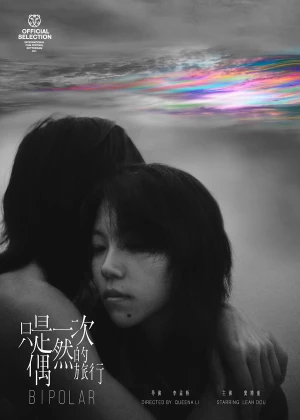Bipolar

Two decades ago China started its big cinematic revolution, which is more or less completed now. It's a far less exciting, more predictable landscape now, with its genre, blockbuster, and arthouse niches clearly defined. That doesn't mean there are no surprising outliers le. Mengqiao Li's Bipolar [Zhishi Yici Ouran de Lüxing] fits snugly into the arthouse category, but minor genre influences and a more outspoken contemporary vibe give the film a unique signature. Getting your hands on it may be a bit of a challenge, but the search is well worth the effort.
![screencap of Bipolar [Zhishi Yici Ouran de Lüxing]](/thumbs/img/articles/1200xauto/bipolar-1.webp)
Though Chinese cinema as a whole went through some major transformations, its arthouse leg has remained quite stable throughout. It's not that it hasn't changed at all, but the core is still very similar to what it was 20 years ago. There's a focus on old and rural China, a critical view on urbanization and it is defined by more traditional styling choices. From afar, Bipolar seems to fit the mold, but from the very first scene, it becomes apparent that Li isn't just going to stick to conventions. Bipolar reminded me of the experimentation often seen during the 00s when China was still boldly looking for its new identity, and that's a very lovely thing indeed.
The film is essentially a drama packaged as a road movie, a bit like The Continent, but with even stronger arthouse cues. It's definitely not the most accessible film and its mix of genres and sensibilities will pose a challenge if it ever hopes to grow beyond a treasured gem for the select few. On the other hand, it's nice to see China hasn't fully defaulted to generic productions and that some directors are still willing to explore beyond what is known to work. That is not to say Bipolar is a wildly original film, but there are enough small touches of brilliance to make it stand out.
The story follows a young girl undertaking a pilgrimage to Lhasa, Tibet. She is running away from a past traumatic experience, hoping to find herself again. When she arrives at her hotel, she hears of their rare lobster, a magnificent creature that is showcased in a small fish tank. She feels sorry for the animal and decides to kidnap it. She gets herself a rental car and sets out on a journey to return the lobster to its original home. The road there is long and treacherous though and she'll need help from the people she meets along the way if she wants to complete her mission.
![screencap of Bipolar [Zhishi Yici Ouran de Lüxing]](/thumbs/img/articles/1200xauto/bipolar-2.webp)
Black-and-white cinematography is always a bit of a double-edged sword. It's an easy way to give your film a bit of extra visual flair, but because of that it can also come off a tad lazy when you don't work twice as hard to make your film look good. Luckily, Bipolar doesn't cut any corners. The exquisite framing, the stark contrast, and the keen eye for lighting all help to make each shot a small treasure. What I liked most though were the sudden bursts of color, adequate proof that any stylistic choices were made with purpose, rather than out of simple conformity.
The soundtrack is solid, a nice companion to the visuals, and not quite as traditional as you may expect from a Chinese arthouse film. Compared to the visual bravoure though, it's definitely the lesser of the two and Li leaves some opportunities unexplored to set the film even further apart from its peers. It's a mix of piano tunes and more soundscape-based music, and it certainly helps to create a gentle and slightly mysterious mood. But as is often the case, there's some untapped potential that I just hate to see go to waste. Maybe next time.
The performances are good, with lead actress Leah Dou being a real find. She's relatively new to the industry, but she sculpts an intriguing and pleasant character who has no trouble guiding the audience through the film. With a strong aesthetic driving the film the actors did have an easier job of course. In many scenes, it was enough for Dou to just be present, but that's hardly a critique on her input. Fans of Chinese cinema may recognize director Zhuangzhuang Tian in a supportive role, a cute little cameo that brought a smile to my face. The rest of the cast is pretty good too, but this film is really all about Dou (and her lobster).
![screencap of Bipolar [Zhishi Yici Ouran de Lüxing]](/thumbs/img/articles/1200xauto/bipolar-3.webp)
Like most road movies, the film isn't so much about the trip itself, nor even about the various people the main character meets along the way. It is more of an excuse to have her come to terms with herself through various adventures and encounters, each teaching her about life in its own specific way. It's a pretty basic formula and the film doesn't seem too eager to deviate from it. It never bothered me, as the lead character was intriguing enough and the film oozes atmosphere from start to finish. That said, if you're not big on road movies, this is probably not the film that is going to change your mind.
I used to be a big fan of Chinese cinema, but the love has subsided a little over this past decade. Their film output has become more stale and risk-averse, but there are still some genuine treasures to be discovered. Bipolar is a stunning road movie, a mysterious trip through the heart of China that doesn't lose itself in the usual contradictions, but sculpts a delicate portrait of its lead character. Lovely cinematography, solid performances, and a fitting score all help to elevate Mengqiao Li's first feature film. Let's hope many more will follow.